
Cycle South East Asia Itinerary
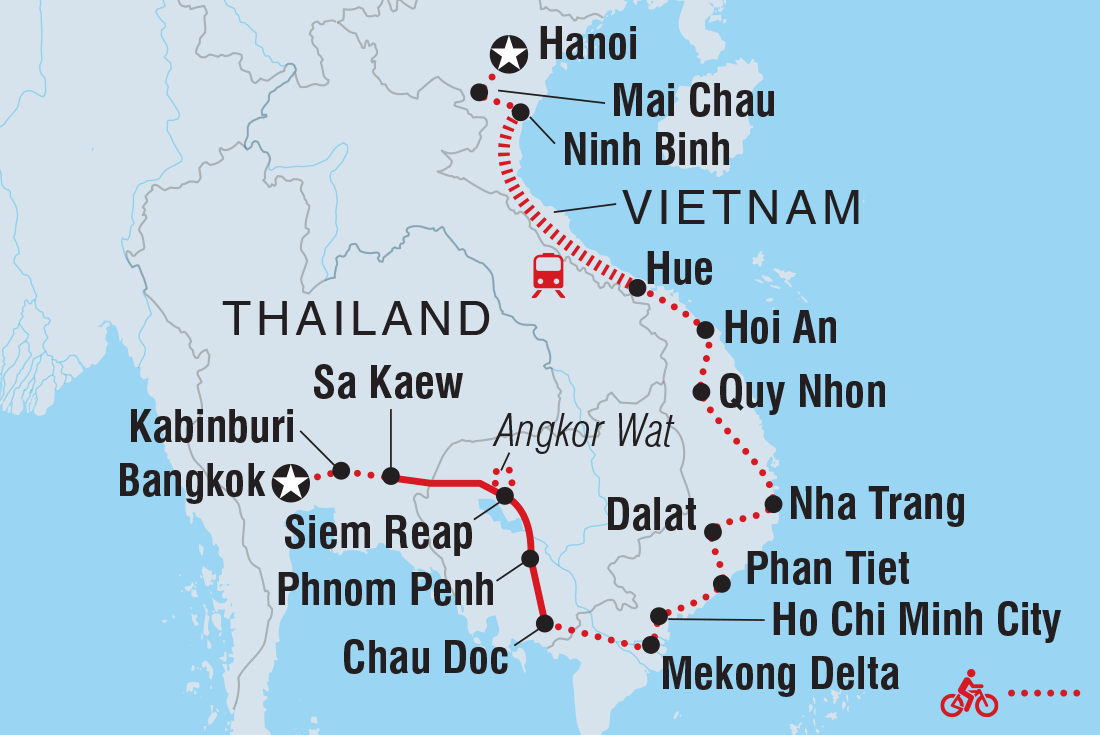


Xin chao! Welcome to Vietnam. Your adventure officially begins in Hanoi with a welcome meeting at 6 pm tonight. If you arrive early, maybe stretch your legs with a walk around Hanoi’s bustling Old Quarter, taking a break along the way for a bia hoi (freshly brewed draught beer). You could also join the queues at the famous Ho Chi Minh Mausoleum or chill out and people watch at Hoan Kiem Lake. After your group meeting, you’ll head out for an included dinner at KOTO restaurant – Vietnam's first social enterprise employing disadvantaged youth.
This morning, you’ll have some free time to explore the city at your leisure. If you haven’t already, walking through the Old Quarter is really the best way to get a feel for the city – an architectural museum where the ancient '36 Streets’ sell everything from souvenirs to exquisite silk clothing, jewellery, embroidered tablecloths, wood carvings and lacquerware. This afternoon, you’ll cycle through the city on a quiet ride around West Lake. Pass by lotus lakes, old school villas and iconic temples including the Tran Quoc Pagoda – the oldest pagoda in Vietnam. Tonight, why not head out for Bahn mi and a local beer – your leader will have the best recommendations!
Saddle up this morning as your cycling adventure kicks into first gear. Leave Hanoi behind and travel by bus to Hoa Binh, stopping at Vun Art on the way – a social enterprise run by people living with disabilities, specialising in craft products made from Van Phuc silk. When you arrive in Hoa Binh, you’ll jump on your bike and cycle to Cao Phong through small ethnic Thai villages and paddy fields. As limestone peaks climb in the background, you’ll take regular stops to admire the view across the valleys. When you arrive, take a short bus ride to Man Duc for lunch. Then, the bus will take you to the Da River Reservoir. Cycle along the Da River, passing karst cliffs through paddy fields. The peaceful town of Mai Chau sits in a beautiful valley surrounded by green mountains and is famed for its scenery and friendly hilltribe peoples. Tonight, you’ll enjoy some local hospitality in your simple stilt-house homestay in the village of Poom Coong. After a home cooked meal, there may be a chance to sample some of the local rice wine that’s produced here.
Say farewell to your homestay hosts and cycle from Mai Chau to Mai Hai and on to Co Luong. You’ll ride through more paddy fields, testing your skills (or suspension) with the shallow potholes along the road. Pass farmers drawn by buffalo and wave to the friendly locals as you cycle. Today is all about the lush green fields, limestone mountains and tranquil waterways. Take a bus along the Ho Chi Minh Road and when you arrive in Ninh Binh, you have the option to take another 36 km cycle around the surrounding area. This is a wonderful chance to see the everyday rural life and take in the countryside.
This morning you’ll cycle from Ninh Binh to Tam Coc to soak up one of Vietnam’s most spectacular views – the limestone karst peaks rising over the rice paddies. Mixed in with the sounds and views of the river, which winds through the fields dotted with boats, you’ll find the true meaning of serene. Cycle to Hoa Lu – once the ancient capital of Vietnam under the 10th century Dinh Dynasty, the temples here were restored in the 17th century and architecture is still in great condition. Here, you’ll take a lunch break at the Dinh or the Le Temple, then it’s back on the bus to return to your hotel. After an early dinner, transfer to Nam Dinh for an overnight train to Hue.
Arrive in Hue this morning and hop back in the saddle to explore the former imperial capital of Vietnam. Hue holds the treasures of the royal past – a mix of bustling streets and tranquil countryside settings. Ride through the fields to some of Hue's many remarkable sites, including temples, bunkers, tombs, ruins, pagodas and country landscapes. Visit the Imperial Citadel, including the Forbidden Purple City, which was almost totally destroyed during the Vietnam War's Tet Offensive. The foliage-covered ruins and gaping holes left by bombs give an idea of the destruction wreaked upon the country during the war. After, kick back in a cafe or restaurant – Hue’s cuisine is considered by many Vietnamese as the best in the country, influenced both by its imperial heritage (small dishes and a focus on presentation) and its strong Buddhist heritage (reflected in the high proportion of vegetarian restaurants).
Leaving Hue, you’ll do some mountainous riding today as you conquer the Hai Van (Ocean Cloud) Pass on the way to the laidback town of Hoi An. This pass is a gorgeous stretch of highway that winds through the Truong Son Mountain Range, with views across the Bay of Danang to the south. It is 500 m above sea level and the up/down slope ranges from 5 to 10 percent. There will be plenty of well-earned breaks along the way to take in the views, snap some photos and rehydrate. When you arrive in Hoi An, you’ll be immersed in the iconic lantern-lit streets, loud markets, tailor shops, artisans, ancient architecture, colourful temples and old school boats lining the river. Recently declared a UNESCO World Heritage site, Hoi An is being beautifully restored and preserved, with parts of the town looking exactly like they did more than a century ago. This makes its streets of low tiled buildings perfect for strolling. Take the evening to soak up the atmosphere, or just rest your legs at a local restaurant after a day’s riding.
This morning, head out on a leader-led walking tour through Hoi An. Discover the history of the Chinese influence as you walk past pagodas and assembly halls. Visit a historic house (formerly home to a prominent trader), the Japanese Covered Bridge, a Chinese assembly hall and a museum. The afternoon is free for you to cycle to the beach, head to the tailor shops or find a spot with a view and make the most of happy hour. For those who love to shop, Hoi An is a mecca with much to browse and buy. There are original paintings, leather goods, handcrafted woodwork, ceramics, embroidery, lanterns and lots more.
Leave Hoi An behind today and head south down Highway One on the way to Phu. On this lesser-travelled route, you’ll drive past paddy fields, see the wheat drying for the local Hoi Beer and pass locals playing chess. When you arrive, climb back on you bike and cycle to the coastal city of Quy Nhon. The city is filled with long stretches of beach and relaxed boulevards, and it’s a perfect spot to get to know the locals as it’s seldom visited by tourists. Tonight, you’ll have free time to get an authentic slice of coastal life.
Today’s cycle is one of the most breathtaking stretches of road you’ll ride on this trip – the highway hugs huge granite cliffs and looks out across the sea. Following parts of the Reunification Railway, you’ll ride alongside spectacular horizons full of islands and lagoons. Join the scooter riders on the waterfront promenade as you arrive in the coastal town of Nha Trang, once referred to as the 'Cannes of the Orient'. The palm-lined beach and island-dotted bay here might just be the best photo op you’ll get! This spot is known for its good weather, vibrant nightlife and excellent diving opportunities.
Today you’ll swap your bike for a boat and head out to explore the nearby islands. This excursion is often the highlight of the trip, as you’ll get to know some of the locals and indulge in the beauty of Nah Trang. Starting on the main boat, you’ll then take a small basket boat to shore and visit a fishing village, snorkel in the turquoise waters and feast on a fresh seafood buffet for lunch. Make the most of your free afternoon by lazing in a deck chair, going for another swim or maybe taking a mud bath to soothe away your sore muscles.
Head up through the Bidoup-Nui Ba Pass into the cooler climate of the South-Central Highlands, where some of the country's best fruits, flowers and coffee beans are grown. The road here is winding and steep but if you're fit and ready for a challenge, you may want to conquer the whole mountain on your bike. You can also take it easy and flag a lift from the bus. Whichever way you choose to get to the top, you'll still be treated to magnificent views when you reach the summit. After a short photo stop here, you’ll descend to Dalat – a perfect base to explore the region, Dalat is often called the 'City of Eternal Spring' for its temperate climate and landscape full of lakes, palaces, pine tree-covered hills, flower gardens and pagodas.
This morning you’ll take a city tour of Dalat, making the journey to Bao Dai's striking regal summer palace. He was the final emperor of the Nguyen dynasty, and the last to rule Vietnam until 1945. You’ll then discover the wacky and weird architecture of Hang Nga Crazy House. Echoing Gaudi's unconventional designs, this place is described as a 'fairytale house' and you’ll explore the twisted tree roots, cave shaped hallways and animal themed rooms with your group. Drop by the train station and the central market before continuing to Di Linh, where the tea industry looms in the surrounding hills. After lunch, pedal down the forest-lined Gia Bac Pass, then cycle from Malam to Phan Thiets beaches.
Before heading to the big city, you’ll spend your last morning taking in the views along the beach on a ride to Lang Long. After a picnic lunch, keep cycling to Cu Bi where you’ll say goodbye to your two-wheeled friend. Hop in your group’s minivan for the final leg to Ho Chi Minh City and discover the fascinating blend of old and new here as East meets West. Maybe spend the final night of your trip with your fellow travellers, exploring the food stalls at Ben Thanh market or with a few glasses of street-side Beer Hoi.
Today is a free day to explore Ho Chi Minh City until the next welcome meeting at 6 pm, where you'll meet your leader and new fellow travellers to discuss the next stage of your journey.
This morning you’ll hop on the bus and drive to the Mekong Delta – known as the ‘rice bowl of Vietnam.’ The fertile delta is famous for its harvest of tropical fruit, flowers and rice, as well as the waterside views over the canals. When you arrive, you’ll get on your bike for the first full day of cycling. Ride along quiet backroads, past farms and villages and make a stop for lunch. You’ll also get to visit orchards and some local cottage industries. Around sunset, make your way up one of the canals by boat to reach your homestay. Tonight, you’ll stay with a local family in their home and sit down for a homecooked dinner of local specialties.
Start the day early with a boat ride, then take a bus to riverside Sadec, where you’ll start today’s ride. Shake out your sea legs with a cycle through the bustling settlements along the river. Here, you’ll see more of how local life is dependent on the river, stopping for lunch in a local community. Cycle on to the ferry and then take a bus to Chau Doc, which sits right next to the Cambodian border. When you arrive, head out in search of the city’s famous hot noodles and a cold beer. The rest of the night is free to explore at your own pace or get some rest in tonight’s hotel.
Cycle to your last destination within Vietnam – the border town of Tinh Bien. On arrival you’ll stop for lunch, then go through visa formalities and cross into Cambodia. Meet your new support team and hop on your bike again on your way to Phnom Penh. You’ll be cycling along dusty and bumpy rural roads for a while, then along a paved highway which leads towards Cambodia’s capital. Avoid the busy roads and jump back into the support vehicle for the drive into the city. When you arrive, you’ll have a free evening to seek out the best Cambodian cuisine to help fuel up after a good day out on the bike. Phnom Penh is quickly becoming a hot destination among foodies, so you can easily load up on grilled seafood, fish curry and green mango salad.
Today, you’ll head to the gold-hued Mongkol Serei Kien Khleang Pagoda on the shores of the mighty Mekong River then take a short ferry to spend the full day on a leisurely ride around Mekong Island (Koh Dach). This 10-hectare island is also known as one of the prominent centres of traditional handicrafts in Cambodia, and you’ll visit some local artisans selling quality silks, pottery and woodcarvings. Cycle past temples and pagodas, then stop at a roadside food stall for a refreshing drink. This afternoon’s ride will take you through the small villages, rice paddies, vegetable farms and fruit orchards of the island, then on to Okhna Tey island (Koh Okhna) before you head back to the mainland for a free evening.
Today you’ll confront Cambodia’s tragic past with visits to several historical sites. Visit the Tuol Sleng Genocide Museum – a former school which served as a Khmer Rouge torture centre. You’ll take a guided tour of the museum where over 20,000 people were once incarcerated and tortured. Next, visit the Choeung Ek Memorial, where a stupa made up of some 8000 human skulls marks the site of the infamous Killing Fields. This was where the prisoners of Tuol Sleng were executed and nearly 9000 corpses have been exhumed from the area. Finally, learn about a brighter period in Cambodian history with a visit to the Royal Palace and Silver Pagoda.
Settle in for a long day of driving as you travel to Siem Reap. Grab a window seat on the bus if you can, as you’ll have some beautiful rural scenery along the way of tiny towns and countryside. Play some road trip games with your fellow travellers, get stuck into your book or take the opportunity to nap as you make the journey. When you arrive, maybe ask your local leader for the best dinner spots!
Today is all about the Angkor Complex – a UNESCO World Heritage site and one of the most important archaeological sites in South-East Asia. Sitting in the jungle and hidden from the world for generations, Angkor is an ancient temple complex and with over 1000 temples there is no better way to explore the sprawling site than by bicycle. From Siem Reap, avoid the traffic and ride out off the main roads and (weather permitting) take small unsealed roads and paths to a remote small but beautiful temple practically unvisited by tourists. Enjoy the quiet then continue on small paths through the foliage to the main sites. When you arrive, you’ll park the bikes and explore the iconic Hindu temple of Angkor Wat on foot. Then, it’s back on the bike to discover the original Buddhist temple in Angkor – the amazing Bayon Temple. Cycle to Ta Phrom temple and indulge your inner Indiana Jones as you stroll through an amazing scene, where nature has taken over the ancient ruins.
Today you’ll cover a lot of distance on your visit to Banteay Srei – the 10th century temple dedicated to the Hindu god Shiva. The temple was rediscovered in 1914 and has some of the most intricate carvings in the world. It was restored shortly after discovery, using traditional techniques and materials. You’ll then have a free afternoon and evening in Siem Reap, to explore or relax at the hotel.
Start your day with a flight from Siem Reap to Bangkok’s Don Muang airport. Then, take a short drive through green fields to start your ride. Jump onto your bike and follow a quiet local road alongside a canal (khlong), then head north, following the winding Chao Praya River as it meanders its way upstream to the ancient capital of Thailand, Ayutthaya. Along the way stop off at the riverside Wat Chaiwatthanaram, a partially restored 17th-century royal Buddhist temple, then finish your ride in the heart of the city at the Ayutthaya Historical Park. This sprawling complex and its incredible array of ancient ruins and temples give an amazing insight into the history of the city that stood as the nation’s capital for around 400 years. If you have time, late afternoon is a great time to visit the park. This evening, perhaps head out for your first meal in Thailand – your leader will know all the best spots to go.
Wake up at sunrise this morning and join the locals who come to give food (alms) to the Buddhist monks from the nearby temples in exchange for blessings. After breakfast, drive to the edge of Khao Yai National Park. From here, enjoy a leisurely ride through the small district of Kabinburi, along quiet roads, past rubber trees, tapioca plantations, rice fields and villages. After a good day in the saddle there is ample time to relax and perhaps soothe those muscles with a Thai massage.
Today, you’ll drive to a small rural village, where you hop back on the bike for your last full day of cycling. Make your way to Khun Dan Dam – Thailand’s largest dam. You’ll ride past small villages, paddy fields, farms and shops. Stop for lunch along the way, then enjoy a quick swim in the dam. After you’re feeling refreshed, you’ll pack up the bikes with your group and hop in a private transfer to Bangkok, your final destination. When you arrive, maybe head out with your local leader and your group for an optional dinner and cheers to a trip well-travelled!
There are no activities planned after breakfast today and your adventure comes to an end. If you'd like to extend your stay, just get in touch with your booking agent ahead of time to organise additional accommodation. If you’re staying in Bangkok, maybe take a riverboat to Chinatown and explore the crowded streets, wander down the tourist mecca of Khao San Road or visit Wat Pho – home to the country's largest reclining Buddha.

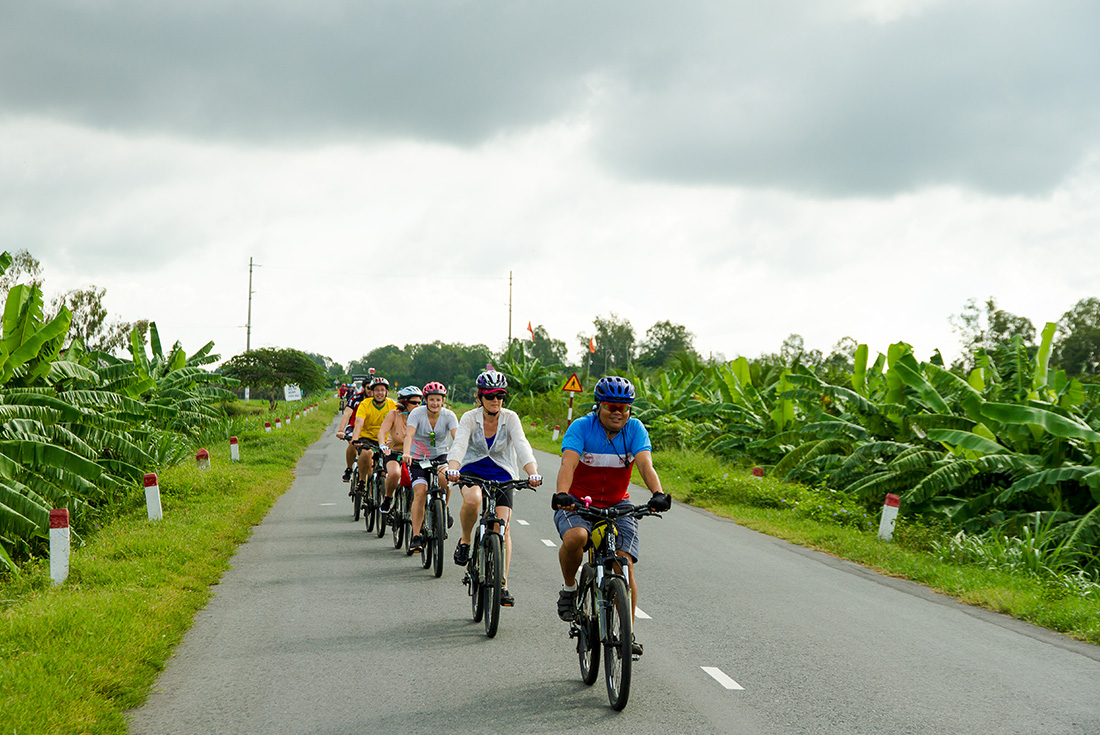
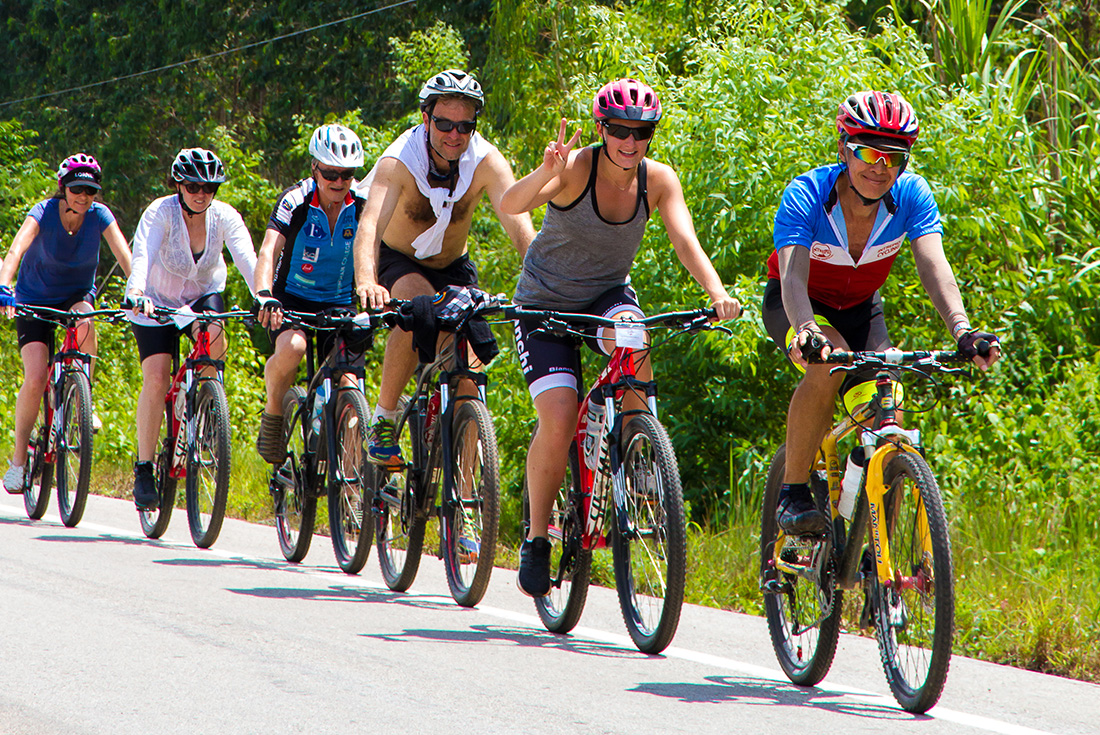
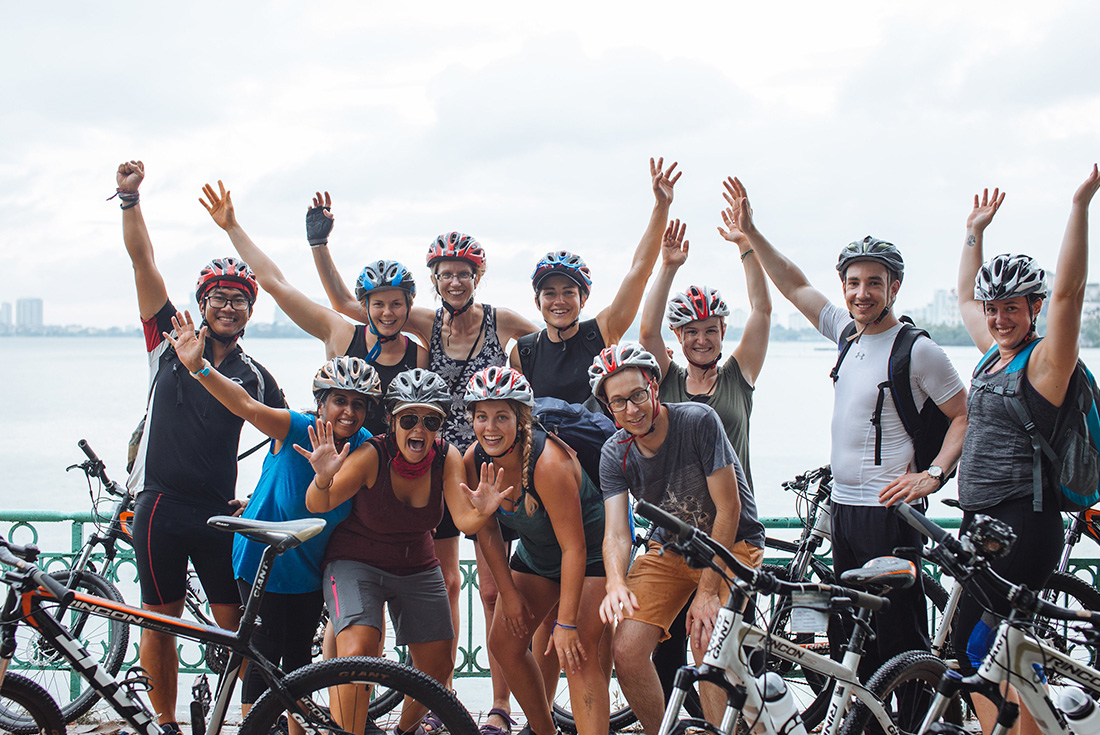
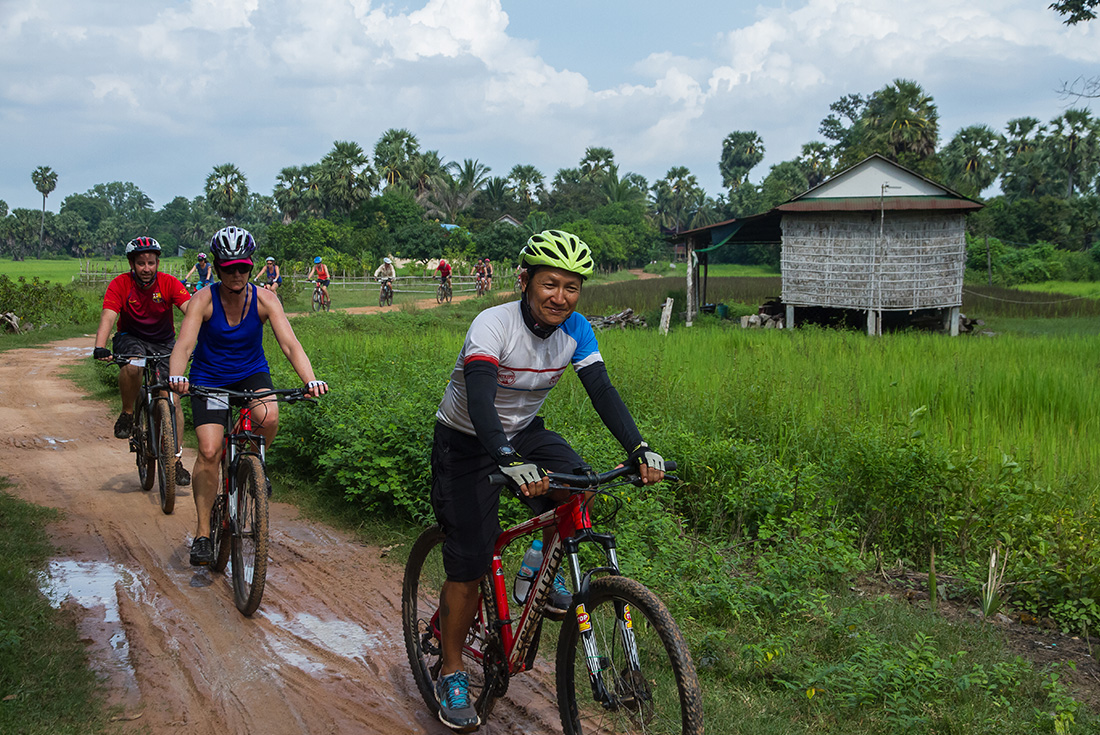
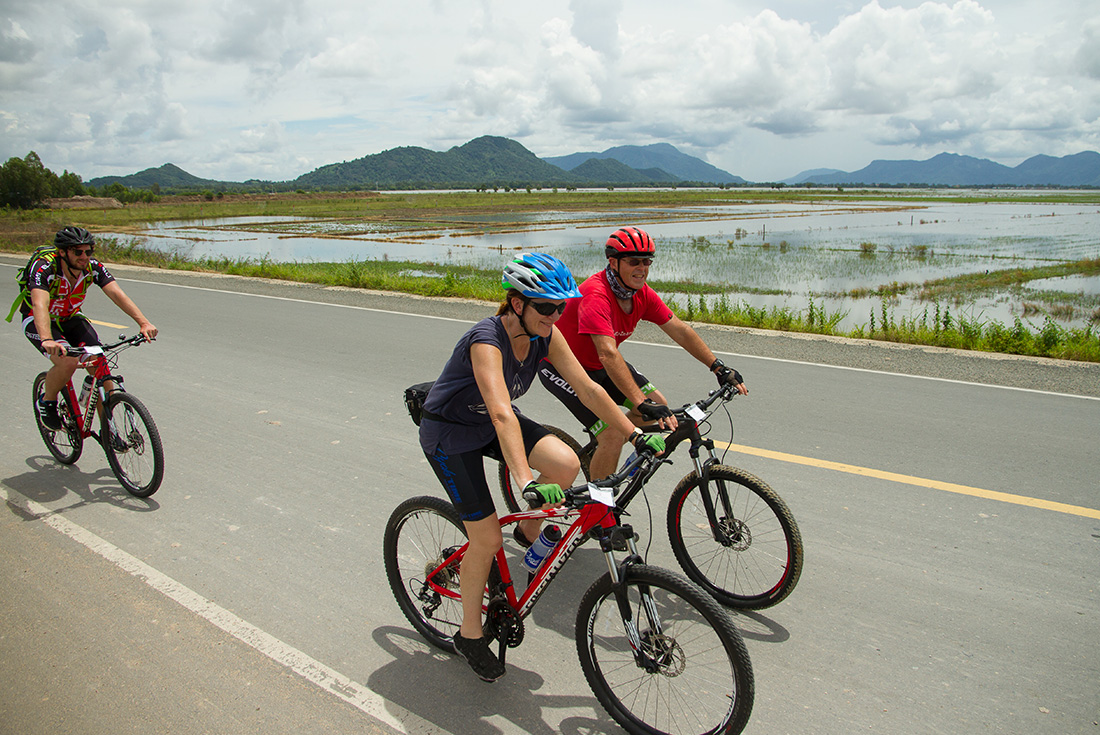
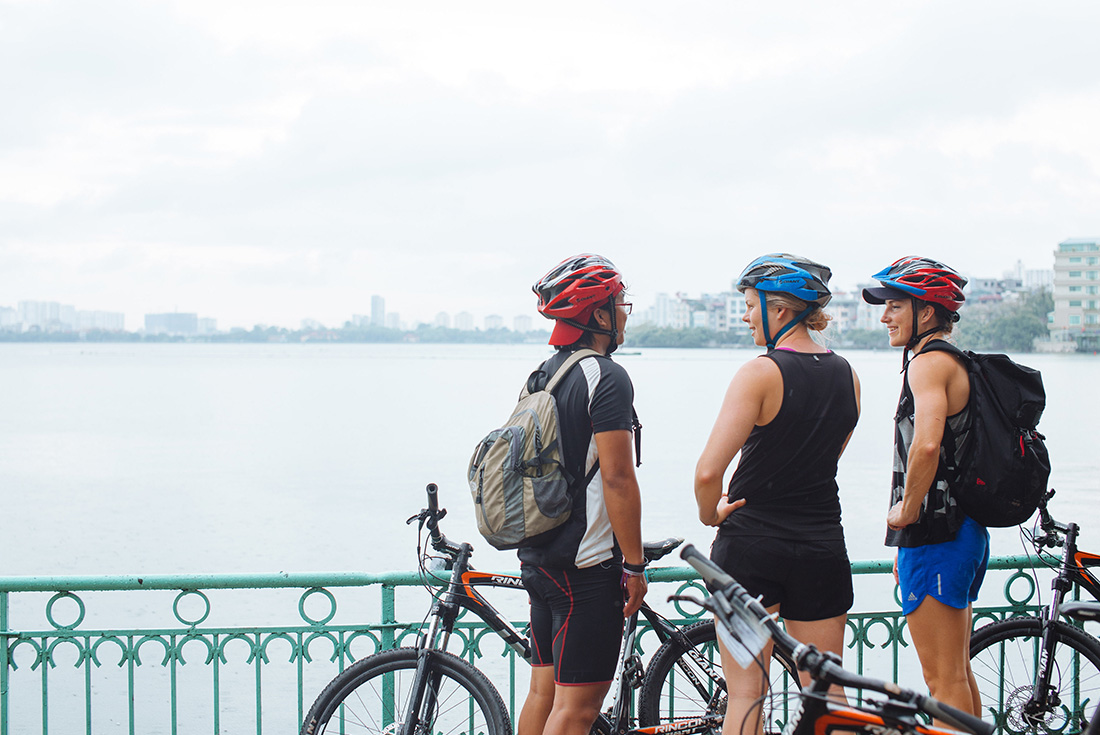
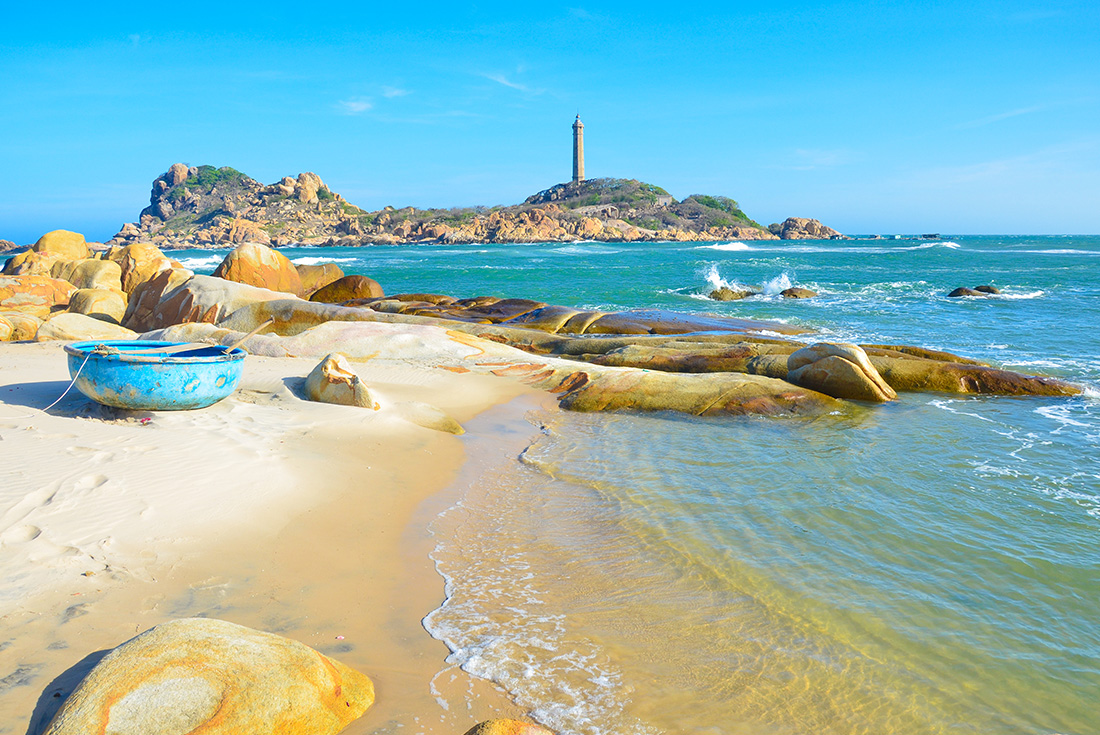
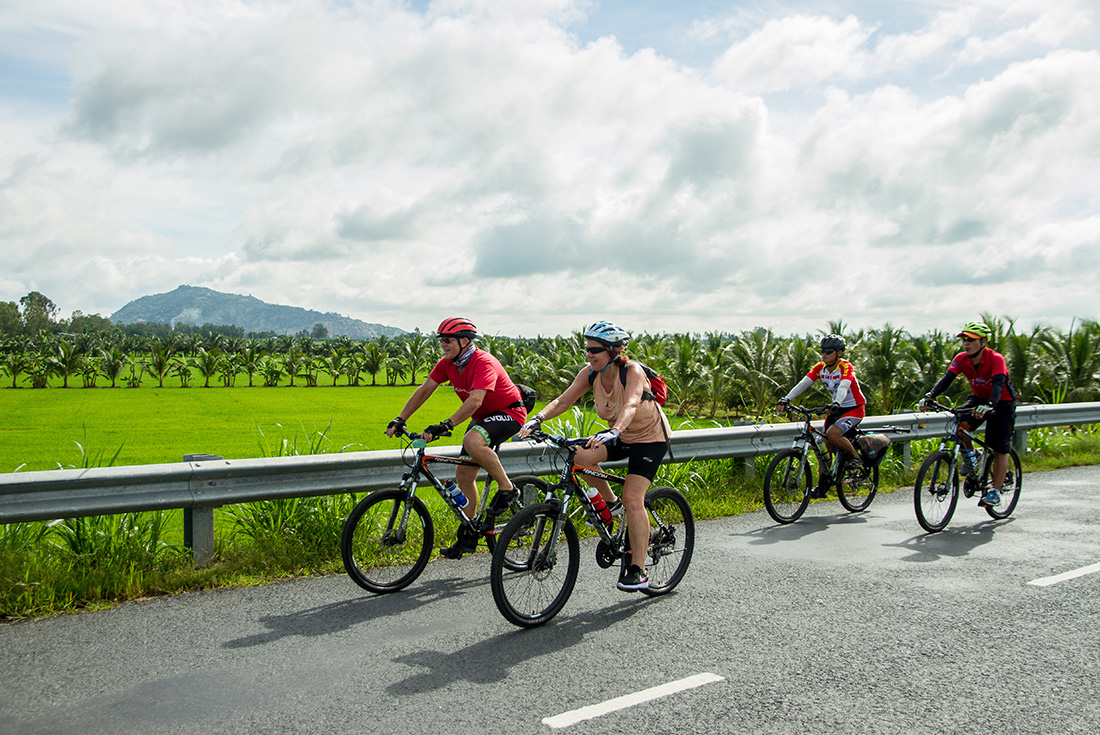
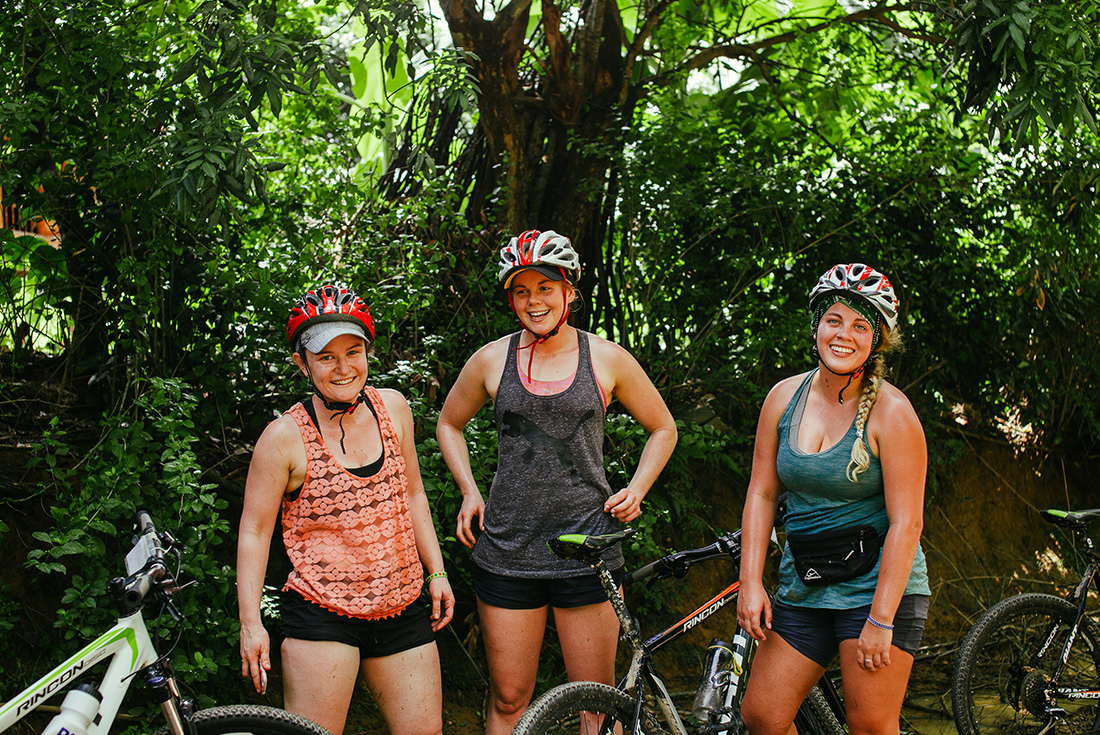
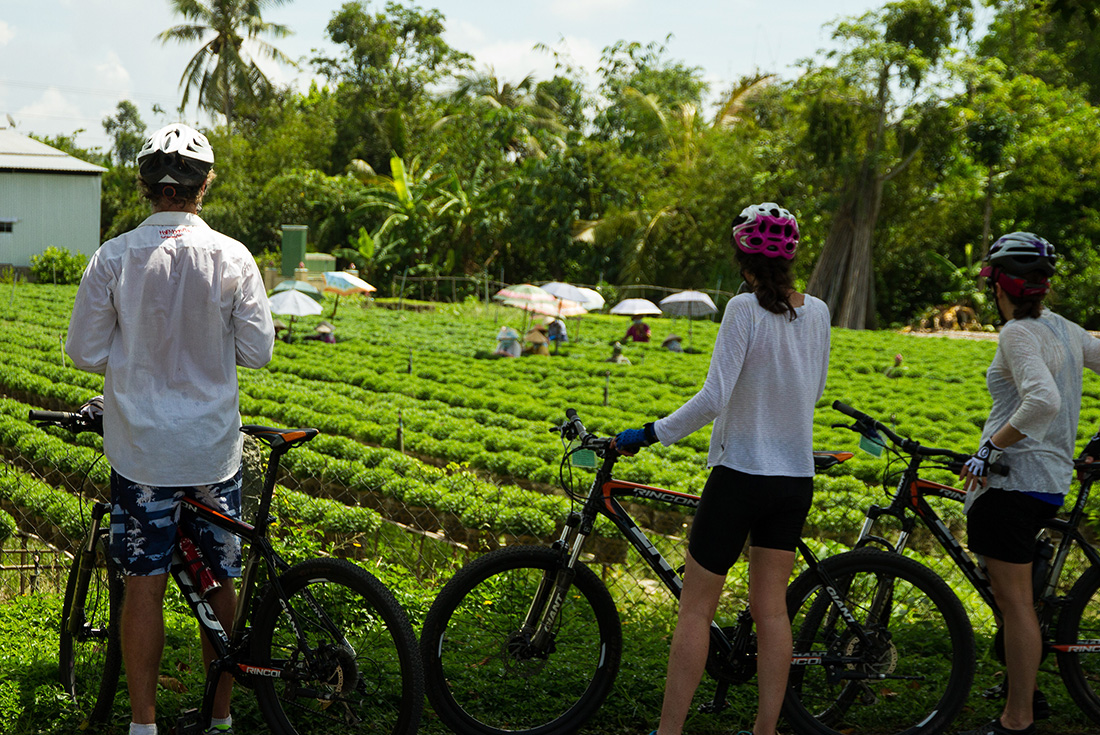
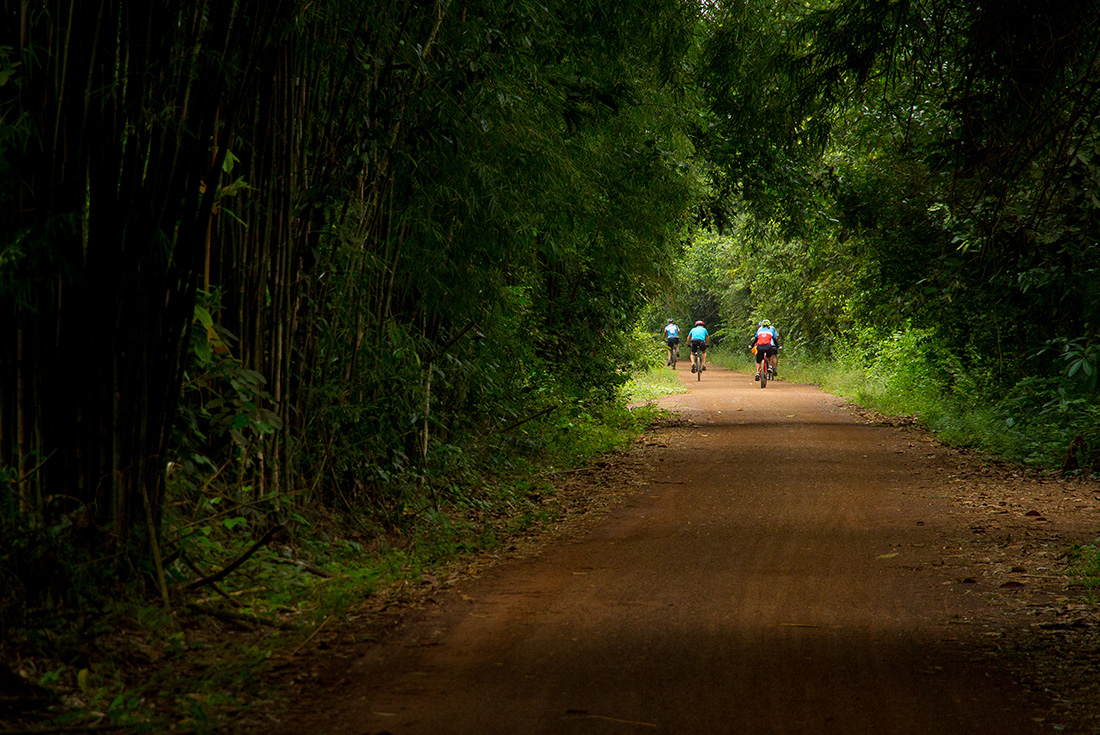
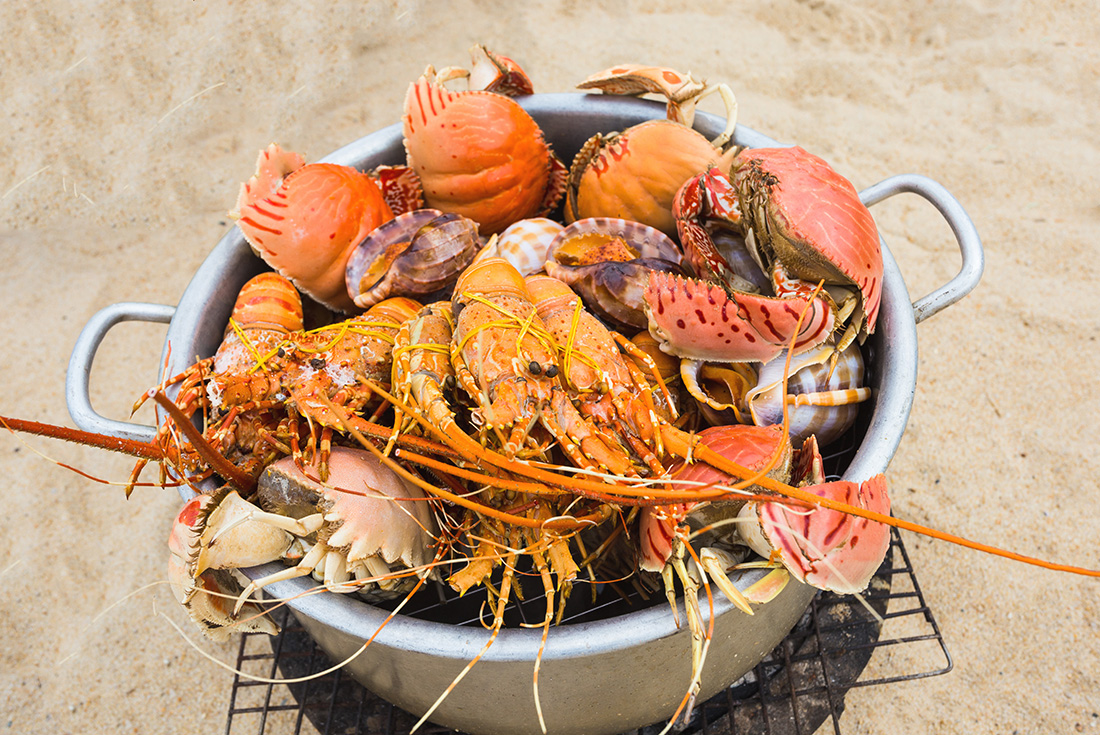
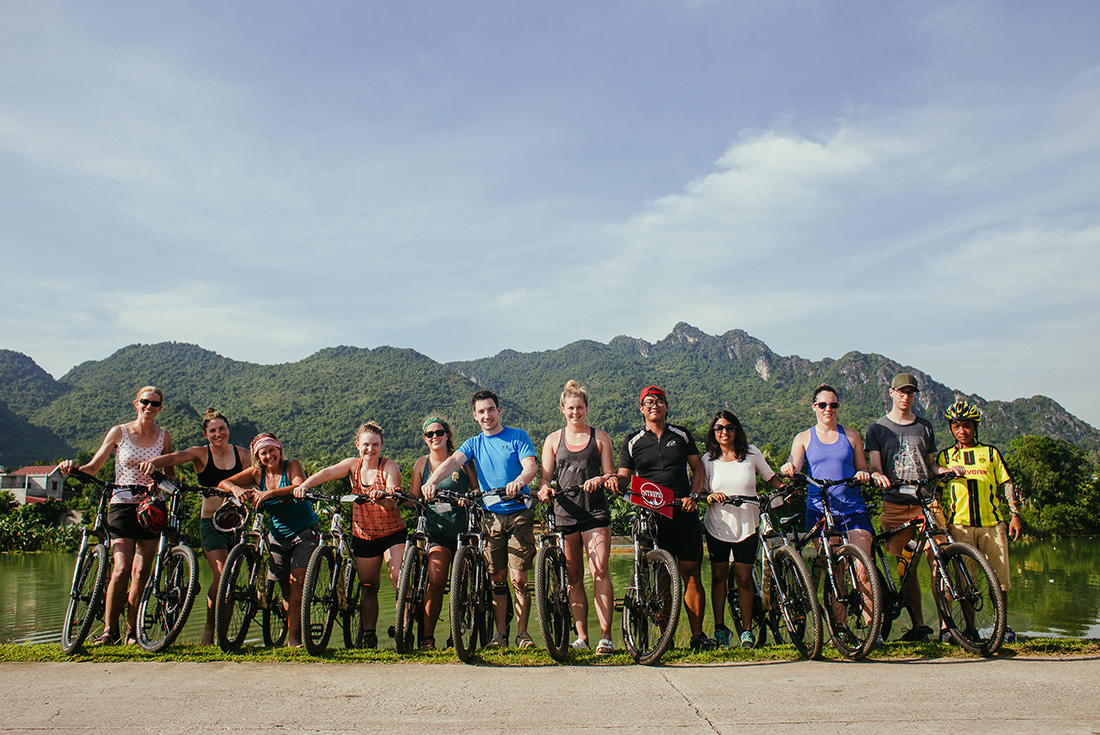
Hanoi - KOTO dinner
Hanoi - Museum of Ethnology
Mai Chau - Pom Coong Village visit & traditional lunch
Hoa Lu - Temple of King Dinh and King Le
Hue - Imperial City Full Day Tour
Hue - Royal tomb of Emperor Tu Duc
Hoi An - Old Town walking tour
Nha Trang - Po Nagar Cham Tower
Hon Mun Island - Snorkelling
Nha Trang - Basket boat ride
Nha Trang - Boat trip
Dalat - Hang Nga Crazy House
Phnom Penh - Tuol Sleng Genocide Museum (S21) & Choeung Ek
Phnom Penh - Royal Palace & Silver Pagoda
Siem Reap - Three Day Angkor Pass
Angkor - Full day temple cycling tour
Ayutthaya - Alms giving at morning market
See the region as you’ve never seen it before (from the seat of a bicycle). Cycling is the ultimate way get off the beaten track!
Work up an appetite for Southeast Asia's famously delicious local and regional food.
Get among nature, wildlife, small villages and ancient ruins, as well as the region's most lively cities, with a local leader who knows all the best secrets.
See one of the best UNESCO sites in Vietnam with a tirp to Ninh Binh, a place of scenic natural beauty, perfect for any nature lover!
See Vietnam, Thailand and Cambodia's best sites while staying active, adventurous and Intrepid.
Thang Long Espana Hotel, 63 Nguyen Truong To Str., Ba Dinh Dist. , Hanoi, VIETNAM, Phone: +84 2437163233, Fax: +84 2437163232
Nouvo City Hotel (Canal Wing), 2 Samsen 2, Samsen Road, Pranakorn , Banglumphu, Bangkok, 10200, THAILAND, Phone: +66 22827500
1. It is very important that you provide your height at time of booking so we can ensure that you have the appropriate sized bicycle when your trip starts. If you do not provide your height ahead of arrival we cannot guarantee a suitably sized bike for you.
2. Please provide your full name exactly as per passport at the time of booking (including any middle names listed on your passport) for train tickets. Fees may apply for amendments to details within 45 days of departure, and in some cases you will be required to cover the cost of issuing new tickets.
3. A single supplement is available if you’d prefer not to share a room on this trip. The single supplement excludes Day 3 (Homestay), Day 5 (Overnight Train) and Day 16 (Homestay) where you will be in shared accommodation and is subject to availability. Please speak to your booking agent for further information.Please note that some room configurations have two single beds, although a double bed will always be requested.
4. Please see your Trip Notes if your departure takes place during Tet, usually in late January/early February. Although we do our best to run trips during Tet as per the scheduled itinerary, it is likely that there will be some changes to transport, accommodation or order of destinations visited.
5. Intrepid cyclists must wear an appropriate bicycle helmet at all times while riding in Vietnam. Good quality helmets are not available in Vietnam so make sure you bring yours from home.
6. During the group meeting, your trip leader will ask you if you would like to contribute to the snack kitty. Please refer to the ETIs Money Matters section for the cost. This would be used to purchase extra supplies of snacks, including nuts and other energy packed goodies. It is not a compulsory kitty, although will make the purchasing of snacks easier and more convenient for you. You can find out more information from your leader upon arrival.
7. This trip starts with a welcome meeting at 6 pm on Day 1 in Hanoi. This trip ends on Day 27 and you are free to leave at any time.
8. Cambodia Visa - The standard e-visa for Cambodia is not valid at Phnom Den border (on entry to Cambodia on Day 18 of this trip). Travelers of all nationalities must apply for visa on arrival, which usually takes approximately 20 to 30 minutes at Tinh Bien/Phnom Den border.
9. An e-bike option (at additional cost) may be available on this trip. We have limited numbers of these bikes available and they are an 'on request' basis only. Please ask your agent for more details at the time of booking.
10. This trip is a combination of 2 trips. Please review the Itinerary for details of when your fellow travellers and leader will change.
11. Thailand is going through a mourning period for the Queen Mother’s passing on 24Oct, 2025. This will last until 24Jan, 2026. The government has announced the recommended attire for visitors during this period and please refer to the Responsible Travel section in the Essential Trip Information for more details.
While we always endeavour to provide the best possible holiday experience, due to the nature of travel and the areas we visit sometimes things can and do go wrong. Should any issue occur while you are on your trip, it is imperative that you discuss this with your group leader or local representative straight away so that they can do their best to rectify the problem and save any potential negative impact on the rest of your trip.
We recognise that there may be times when your group leader or local representative may not be able to resolve a situation to your satisfaction - if this is the case, please ask the group leader or local representative to speak to their direct manager.
You may also choose to provide details in your online feedback, which we ask you to complete within 30 days of the end of your trip. Please do be aware that it is very difficult for us to provide any practical help after the trip is completed, so informing us while still travelling will give us the opportunity to resolve the issue in real-time., For general contact details please use the following page: https://www.intrepidtravel.com/contact-us, In case of a genuine crisis or emergency, you can reach our local office on the numbers below:
, Intrepid Vietnam: +84 90 311 7770. Intrepid Thailand & Cambodia: +66 89 810 3722., Intrepid local operator : Available for phone call on +84 90 311 7770
To complete this trip it is important that you are both confident and competent in riding a bicycle. You’ll be cycling for up to 70 km per day on varied terrain – this trip is for the reasonably fit., The weather in this region can be varied. Be prepared to get sweaty and for the occasional rain storm, which may require a change of plans., If you feel like doing all the riding but with less effort, you'll have the option of hiring an electric bike.
See the region as you’ve never seen it before (from the seat of a bicycle). Cycling is the ultimate way get off the beaten track!, Work up an appetite for Southeast Asia's famously delicious local and regional food., Get among nature, wildlife, small villages and ancient ruins, as well as the region's most lively cities, with a local leader who knows all the best secrets., See one of the best UNESCO sites in Vietnam with a tirp to Ninh Binh, a place of scenic natural beauty, perfect for any nature lover!, See Vietnam, Thailand and Cambodia's best sites while staying active, adventurous and Intrepid.
All Intrepid cycling group trips are accompanied by one of our cycling leaders. The aim of the group leader is to take the hassle out of your travels and to help you have the best trip possible. Intrepid endeavours to provide the services of an experienced leader however, due to the seasonality of travel, rare situations may arise where your leader is new to a particular region or training other group leaders.
Our cycling leaders are all passionate cyclists, as you’d expect, but they also go through some pretty rigorous cycle-trip specific training. Each one has undergone on-road training and supervision and knows how to do safety checks, basic repairs and emergency first-aid. And at the end of the day they’re still regular Intrepid leaders, which means they will provide information on the places you are travelling through, offer suggestions for things to do and see, recommend great local eating venues and introduce you to our local friends. While not being guides in the traditional sense you can expect them to have a broad general knowledge of the places visited on the trip, including historical, cultural, religious and social aspects. At Intrepid we aim to support local guides who have specialised knowledge of the regions we visit. If you were interested in delving deeper into the local culture at a specific site or location then your leader can recommend a local guide service in most of the main destinations of your trip., Generally we use different support crew and vehicles for each country, but all groups will be accompanied by one experienced cycling tour leader from start to finish, either Thai, Cambodian or Vietnamese. If required the tour leader will be assisted local guides from each country.
We take safety seriously on all our trips, but cycling tours deserve a few special considerations.
HELMETS:
Helmets are compulsory and we do not allow anyone to ride without one (including our own staff!). You can bring your own, or purchase one that meets international safety standards on the ground. Your leader can assist with this.
FOOTWEAR
For safety reasons we strongly recommend that you wear shoes that cover the toes while riding.
SUPPORT VEHICLES
We usually have a support vehicle following us if first-aid is ever necessary or people are feeling too tired to ride.
BIKES:
Our bikes are serviced regularly, and we get them checked by experts before each and every trip. Should you choose to bring your own please note that while we are happy to assist where we can with repairs you are responsible for the safety and suitability of your own equipment.
TRAFFIC AND DRIVING ON THE OTHER SIDE OF THE ROAD:
Depending on where you come from please note that drivers in this part of the world may drive on the opposite side of the road from what you are used to. Look both ways before crossing any road. Traffic can be a little more chaotic than you might be used to at home. Be aware!
There are times when traffic conditions make sections of our planned riding route unsafe – in this instance we will use the support vehicle.
WEATHER
Due to inclement weather posing a serious health or safety issue there may be times when we use the support vehicle instead of doing the planned ride. We will endeavour to reroute if possible but at times may have to cancel the planned ride., FIRE PRECAUTIONS:
Please be aware that local laws governing tourism facilities in this region differ from those in your home country and not all the accommodation which we use has a fire exit, fire extinguishers or smoke alarms.
SEAT BELTS:
Please be aware that local laws governing transportation safety may differ from those in your home country and not all the transport which we use is able to provide seat belts.
PETTY THEFT AND PERSONAL SAFETY:
While travelling there is always the risk of pick-pocketing and petty theft, particularly in the more touristy cities. We recommend that you exercise caution when walking alone at night and encourage you to walk together and only on main, well-lit thoroughfares. Be particularly vigilant on public transport. Simple measures like carrying your day pack on your front, not hanging your bag over the back of your chair or on the floor and wearing a money belt will reduce any chance that your valuables should go missing.
MOTORBIKE BAG SNATCHING:
Be particularly aware of motorbike bag snatching, especially in the bigger cities.
PASSPORT
You’ll need a valid passport to travel internationally and most countries require your passport to have a minimum of 6 months validity, so remember to check the expiry date.
We need your passport information to get everything ready for your trip so it’s important that the information on your booking matches your passport exactly. Please take care to provide the correct details. We recommend carrying a copy of the photo page of your passport while travelling and leaving a copy at home with family or friends.
VISAS & ENTRY REQUIREMENTS
Many countries require a visa and obtaining the correct visa for your trip and any countries you may transit through is your responsibility. We recommend you check your visa requirements as soon as you have booked your trip. This will ensure you have time to prepare your documents and for your visa application to be processed. You can check the entry requirements for your nationality on your government's foreign travel advisories, consular websites or on our page here: www.intrepidtravel.com/visa-entry-requirements, CAMBODIAN VISAS
The standard e-visa for Cambodia is not valid at Phnom Den border (on entry to Cambodia on Day 4 of this trip). Travelers of all nationalities must apply for visa on arrival, which usually takes approximately 20 to 30 minutes at Tieh Bien/Phnom Den border.
, Travellers who arrive in Cambodia via flight to Phnom Penh, Siem Reap or Sihanoukville international airports will need to obtain an E-Arrival card via www.arrival.gov.kh or via Cambodia E-Arrival app in the App Store and Play Store for mobile phones or other electronic devices. This needs to be obtained within 7 days before your arrival into the country and will be required at immigration procedures. Please take a screenshot or download your QR code before closing or exiting the E-Arrival Card website. If you use the mobile application, the QR Code will be available after successful submission even without internet connection. Or you may print your E-Arrival QR code.
Please note that the e-arrival card is not a visa. You'll still need to obtain a visa for Cambodia if required.
, DUAL PASSPORT HOLDERS
For travel between countries in South East Asia you will need to travel on the same passport for all border crossings. Immigration authorities will need to see entry and exit from the previous country before allowing you to enter their country., ADDRESS FOR VIETNAM VISA APPLICATIONS
If you require an address for your visa application, please use:
Intrepid Vietnam
Ground Floor, Ladeco Building
266 Doi Can St, Doi Can Ward
Ba Dinh District, Hanoi
Vietnam
Ph +84 4 3715 0996
ADDRESS FOR CAMBODIA VISA APPLICATIONS
If you require an address for your visa application, please use:
Intrepid Cambodia
92 Taneuy Street
Wat Bo Village
Siem Reap
BORDER CROSSINGS ON THIS TRIP:
On Day 18 we cross the border from Vietnam to Cambodia:
The Vietnamese border is Tinh Bien.
The Cambodian border is Phnom Den.
To help calculate the exact dates of these crossings we have found the following website to be very useful - www.timeanddate.com
, The standard e-visa for Cambodia is not valid at Phnom Den border (on entry to Cambodia). Travelers of all nationalities must apply for visa on arrival, which usually takes approximately 20 to 30 minutes at Tinh Bien/Phnom Den border.
Information not available.
Validity: 01 Jan 2026 to 31 Dec 2026
GENERAL HEALTH
All travellers need to be in good physical health in order to participate fully on this trip. For the safety and wellbeing of yourself and others, if you are unwell prior to travelling, please stay at home and contact us to make alternative arrangements.
When selecting your trip please make sure you have read through the itinerary carefully and assess your ability to manage and enjoy our style of travel. Please note that if in the assessment of our group leader or local representative a traveller is unable to complete the itinerary without undue risk to themselves and/or the rest of the group, we reserve the right to exclude them from all or part of a trip without refund.
You should consult your doctor for up-to-date medical travel information or for any necessary vaccinations before departure. We recommend that you carry a first aid kit as well as any personal medical requirements in their original packaging as they may not easily be obtained while travelling. If you are carrying medication, ensure you check your government's foreign travel advice for any local restrictions or requirements.
, DENGUE FEVER:
Rare instances of dengue fever have been reported in this region. This virus is transmitted by mosquitoes. There is no vaccination against it, but there are preventative measures that you can take such as wearing long clothing and always using repellent. Please note that this mosquito is most active during daylight hours however care should be taken at all times., DRINKING WATER:
As a rule we recommend you don't drink tap water, even in hotels, as it contains much higher levels of different minerals than the water you may have at home. For local people this is not a problem as their bodies are used to this and can cope, but for visitors drinking the tap water can result in illness. Generally this isn't serious, an upset stomach being the only symptom, but it's enough to spoil a day or two of your holiday. Bottled water is widely available and your leader can recommend safe alternatives when available. Water consumption should be about three litres a day. Rehydration salts, motion sickness tablets, and diarrhoea blockers are available from many pharmacies., CYCLING HEALTH
Riding across unfamiliar terrain in weather conditions that you are not used to can potentially lead to cycling-related health issues. The most common of which is dehydration. While this arises most frequently on warm/hot days, it is also a factor during cold weather as you continue to sweat. Research shows that most riders will typically lose 500-1000 ml of water per hour. While we schedule in frequent rest stops and encourage you to refill water bottles at every opportunity, it is the responsibility of each cyclist to monitor their own levels of hydration. The key point to remember is not to wait until you’re thirsty, but to drink small amounts regularly from the start of your ride. Adding an electrolyte solution can aid in replenishing the salts/electrolytes lost through physical activity. , AIR POLLUTION AND SMOKE HAZE:
Bangkok and other Thai cities experience high levels of air pollution, which may aggravate bronchial, sinus or asthma conditions. These can be particularly high between the months of December and February. Smoke haze, which usually occurs across parts of north and north-east Thailand during March to April, can also aggravate these conditions. You may wish to take a quality mask with you if you are particularly sensitive to smoke. Regular air quality reports are available from the following website http://aqicn.org/city/bangkok/
While travelling with us you'll experience the vast array of wonderful food available in the world. Your group leader or local representative will be able to suggest restaurants to try during your trip. To give you the maximum flexibility in deciding where, what and with whom to eat, generally not all meals are included in the trip price. This also gives you more budgeting flexibility. As a rule, our groups tend to eat together to enable you to taste a larger variety of dishes and enjoy each other's company. If you have dietary requirements and/or food allergies, please let your booking agent know prior to departure., Food is cheap in SE Asia and you can generally avoid the spicier food if you wish. Western food is readily available almost everywhere. Vegetarians are well catered for but please inform us before departure of any special dietary requests. Please note that in SE Asia the availability of certain specialized products for restricted diets, e.g. gluten-free or dairy-free, is minimal or non-existent and we strongly recommend you bring these specialized dietary items from home. You may find it beneficial to bring some 'cycling snacks' with you from home; high energy snacks are not readily available locally. For snacks and drinks during the rides, a kitty is normally arranged.
SPENDING MONEY
When it comes to spending money on the trip, every traveller is a little different. You know your spending habits better than we do, so please budget an appropriate amount for things like optional meals, drinks, shopping, optional activities, and laundry. Make sure you have read the itinerary and inclusions thoroughly so you know what is included in the trip price and what you may need to pay for while travelling. , BUDGET FOR MEALS NOT INCLUDED: USD 530 - This includes the optional Snack Kitty on the Vietnam leg of this trip.
SNACK KITTY:
During the group meeting, your trip leader will ask you if you would like to contribute to the snack kitty for Vietnam section of the trip. This is usually $40USD per person, less if you have a large group of 10 people or more. The snack kitty is spent on water, fruits, the local-made lemonade juice, energy top-up snacks, coffee stops, bathroom stops. It is not a compulsory kitty, although will make the purchasing of snacks easier and more convenient for you. The left over funds will be returned at trip end. You can find out more information from your leader upon arrival., VIETNAM
You can use your credit/debit card in ATMs, which are common throughout Vietnam. These machines dispense cash in VND (Vietnamese dong). Credit/debit cards aren’t accepted for small payments in Vietnam so please ensure you have VND cash to cover daily expenses. Clean banknotes in small denominations are most useful., CAMBODIA
You can use your credit/debit card in ATMs, which are common throughout Cambodia. These machines dispense cash in USD. There is also no need to pre-purchase Cambodian riel prior to arriving in the country. Most travellers never need to have more than USD 20 – 30 worth of Cambodian riel on them at any one time, as USD cash is widely accepted. After making a payment in USD, change is often given in Cambodian riel. Many businesses are unable to change larger notes, so we recommend carrying a mix of denominations. We recommend bringing large bills in good condition, 2013 series onwards only. Any old or damaged notes may not be accepted. Some banks at Cambodian airports may tell you that you need to change your USD cash into Cambodian riel, but this is not true. , THAILAND
You can use your credit/debit card in ATMs, which are common throughout Thailand. These machines dispense cash in THB (Thai baht). Credit/debit cards aren’t accepted for small payments in Thailand so please ensure you have THB cash to cover daily expenses. Clean banknotes in small denominations are most useful., TIPPING
Tipping can be an appropriate way to recognise great service when travelling. While it may not be customary in your home country, it is an entrenched feature of the tourism industry across many of our destinations and is greatly appreciated by the people who take care of you during your travels. It is always best to avoid tipping with coins, very small denomination notes, or dirty and ripped notes, as this can be regarded as an insult rather than the goodwill gesture it is intended to be., OPTIONAL TIPPING KITTY
On Day 1 of your trip, your group leader or local representative may discuss with you the idea of operating a group tipping kitty, whereby everybody contributes an equal amount and your group leader or local representative distributes tips for drivers, local guides, hotel staff and other services included on your trip. Participation in this kitty is your choice, and you are welcome to manage your own tipping separately if you prefer.
The group leader or local representative will keep a running record of all monies spent, which can be checked at any time. Any funds remaining at the end of the trip will be returned to group members. These tips to suppliers are for great service and are in addition to the regular costs paid for the services supplied.
The tipping kitty excludes tips for your group leader or local representative, and providers of optional activities., Optional tipping kitty from Hanoi to Ho Chi Minh City: USD 28 per person (can be paid in local currency).
Optional tipping kitty from Ho Chi Minh to Bangkok : USD 18 per person (can be paid in local currency)., YOUR GROUP LEADER OR LOCAL REPRESENTATIVE
Tipping your group leader or local representative is highly appreciated if you feel they’ve provided outstanding services throughout your trip. The amount is entirely a personal preference; however, as a guideline, the recommended amount is 4-7 USD or EUR per traveller per day (in a currency relevant to your destination). Of course, you are free to tip more or less as you see fit, depending on your perception of service quality and the length and involvement of your group leader or local representative on your trip., CONTINGENCY FUNDS
We try to plan for every eventuality, but there are still some things beyond our control. We reserve the right to change an itinerary after departure due to local circumstances or a Force Majeure Event. In such emergency circumstances, the additional cost of any necessary itinerary alterations will be covered by you. Please note we are not responsible for any incidental expenses that may be incurred as a result of the change of itineraries including but not limited to visas, vaccinations or non-refundable flights. Make sure you have access to an extra US$500 for emergencies (e.g. severe weather, natural disasters, civil unrest) or other events that result in unavoidable changes to the itinerary (e.g. transport strikes or cancellations, airport closures). Sometimes these things necessitate last-minute changes to enable our trips to continue to run, and as a result, there may be some extra costs involved. The recommended amount is listed in USD for the relatability of universal travellers, however, local currency may be needed once in the country to cover these costs., COMMISSIONS
Intrepid understands that the receipt of commissions in exchange for recommending particular shops or services is ingrained in the culture of the tourism industry. For this reason, we have established a centralised fund for contributions from recommended suppliers so these can be collected and distributed back into the business. Actively managing the receipt of commissions helps us maintain the level of quality you expect on one of our trips. Travel is always an adventure so Intrepid cannot explicitly guarantee the quality of a product but we aim to provide the best value trips in the market. Please let us know via the feedback form completed after your trip if we are successfully meeting - or exceeding - this objective.
CYCLING
Packing for a cycling tour isn’t that different from any other adventure, but if you want to be comfortable and warm, here are a few bike-specific requirements and suggestions:
• Main piece of luggage – as space in our support vehicle/transport can be limited we request that you bring only a small bag as your main piece of luggage. We recommend a soft-sided bag
• Helmet – these are compulsory, but if you don’t have your own you can often purchase an approved and well-fitted one at the start of the trip (our leaders can assist you with this). There are some destinations where you are unable to purchase appropriate helmets locally so you will always need to bring your own - please check the 'Important Notes' section to see if this is the case.
• Padded bike shorts
• Quick-dry jerseys – you can get away with a few cotton t-shirts but having a few light and breathable jerseys will make your cycling a lot more comfortable, especially in warmer/humid climates.
• Quick-dry socks
• Cycling gloves / Regular gloves – not essential but recommended as padded cycling gloves will make your riding more comfortable and can help protect you in the case of a fall. Regular gloves for those who may not own cycling gloves to keep hands warm in cold wet weather.
• Rain gear – pack a light poncho in case the weather turns when you’re out on the road.
• Light breathable waterproof/windproof outer layers – especially useful for those early mornings or downhill sections when wind-chill becomes a factor.
• Water bottle – we don't provide bottles, but all our bikes have one bottle holder fitted (and a second one can be fitted if required). Please bring a cycling-specific water bottle as other types will fall out of the holders. A Camelbak will make drinking on-the-go easier.
• Sunglasses – well-fitted sports sunglasses help protect against dust, insects and the sun.
• Day pack – our support vehicle will carry your main piece of luggage, but a day pack for snacks and clothes is a good idea.
• Sunscreen – please bring a high protection factor (e.g. SPF50) sunscreen as long days in the saddle mean long exposure to the sun.
• Shoes – normal sports shoes can be worn on all our trips however you may want to consider a flat shoe with a relatively stiff sole as it makes pedalling a lot more efficient. Regular cyclists are welcome to bring their own cycling-specific shoes however we recommend 'mountain bike' style shoes that have grip on the sole rather than ‘road bike' shoes as you will still be walking around while on the rides (cafe/photo/toilet stops, etc). For safety reasons we require that you wear shoes that completely cover the toes while riding.
• Saddles – Our saddles are standard, unisex models –less experienced cyclists may choose to bring your own gel seat cover for added comfort.
• Pedals – all bikes come with flat pedals. Regular cyclists are welcome to bring their own pedals – our leader will assist in fitting them to your bike.
• Bike Lights - we design our Cycling trips so that you are usually riding during daylight hours so do not include bike lights unless a night ride is specifically planned and included in the itinerary. Should you feel more comfortable riding with 'daytime' flights please bring your own and we will be happy to assist in fitting them to your included bicycle.
, Siem Reap to BKK included flight Luggage Allowance
Luggage limits on Siem Reap to Bangkok are 20kgs check-in and 7kg hand luggage.
TET
16 – 20 February 2026
Tet is Vietnam’s New Year festival which takes place in late January/early February based on the lunar calendar and is the most important celebration of the year. While this can be a fascinating time to be in Vietnam, you do need to be prepared for some businesses to be closed, tourist sites to be very busy and for transport to be packed as many Vietnamese are travelling around the country. Although we do our best to run trips during Tet as per the scheduled itinerary, it is likely that there will be some changes to transport, accommodation or order of destinations visited. Due to the high demand on tickets at this time, flights and overnight trains may on occasion need to be replaced with day buses. We will aim to communicate any known changes prior to your departure., CAMBODIAN FESTIVALS & HOLIDAYS:
During public holidays and festival periods in Cambodia some businesses may close, transport may be extremely busy and travel times may increase. The main holidays in Cambodia are:
Chinese New Year (16 - 19 February 2026)
Khmer New Year (14 - 16 April 2026)
Royal Birthday of the King Sihamoni (14 May 2026)
Pchum Ben Day (10 - 12 October 2026)
Water & Moon Festival (23 - 25 November 2026)
Intrepid won't tolerate any kind of violence, harassment (whether physical, verbal or sexual), or disrespect toward fellow travellers, our teams or local communities.
To ensure the wellbeing of everyone on the trip, decisions made by your group leader are final.
Romantic relationships between travellers and group leader or local representative are not permitted while on trip.
Any behaviour that prevents your leader from continuing the itinerary as planned, breaks local laws or opposes any of these guidelines may result in Intrepid denying your booking or removing you from the trip.
If something concerns you during your travels, please speak to your group leader immediately. Alternatively, you can contact us on the emergency contact number detailed in the Problems and Emergency Contact Information section of this Essential Trip Information. , While we do accept children under 18 on this trip we do have a couple of rules. From a safety and enjoyment perspective they should be confident and competent cyclists capable of completing the riding part of the itinerary without additional assistance. Minors under 18 years old must always be accompanied by a parent/legal guardian. This includes when the minor rides in the support vehicle.
OVERNIGHT SLEEPER TRAINS:
Compartments will be 4 berth to 6 berth depending on seasonal variations and the group configuration. We aim to secure 4 berth compartments where possible. 6 berth compartments have bench seats that convert into sleeping bunks. A sheet, pillow and blanket are provided, although some travellers prefer to bring their own sleeping sheet. On occasion, passengers of different genders will be required to share a compartment and there will be occasions where you'll be sharing with local travellers or travellers who are not part of your group. Most trains have a dining carriage serving simple food, but some travellers take the opportunity to stock up on fresh bread, cheese and fruit prior to departure., HOTEL IN HO CHI MINH CITY
Please note as this trip is a combination trip you may be required to move hotels in Ho Chi Minh City on day 10. Your leader in Vietnam will advise you if this is required and assist with transport to the next hotel., WINDOWLESS ROOMS:
Some hotels in South East Asia have windowless rooms, or windows that don't necessarily have a view. This is often due to high population density in large cities, however local building standards also do not require rooms to have windows. We do request rooms with windows, however they aren't always available., BASIC ACCOMMODATION
Some of the accommodation along the way is very basic, staying in local guesthouses and homestays with limited facilities. Some facilities are shared and some accommodation has cold water only.
While there are occasions when we use local public transport such as trains, buses or taxis to cover long distances or attend non-cycling activities, we predominantly use the bicycle as our main form of transport. On most of our trips we also have a support vehicle as secondary transport for travelling longer distances, avoiding hazardous areas to cycle, as a backup should we have any incidents and of course as an option for those that would prefer not to cycle for an hour or a day. In most regions, the support vehicle will be a minivan, but may range in size up to a full-sized coach or overland vehicle. Your main piece of luggage is transported in the support vehicle. Our bikes do not have panniers or bags on them, so we recommend a small backpack or a cycling jersey with rear pockets to carry any essentials you’ll need with you., OUR BIKES - VIETNAM
In Vietnam we use a mixture of Giant Rincon Disc 1 and Giant Rincon 2 Disc bikes for sizes Small to Large. For size Extra Small we use the Giant Talon 4. These bikes are mountain bike-style with flat bars, front suspension, 24 gears and hydraulic disk brakes. For more specific information please see https://www.giant-bicycles.com/int/rincon-disc--gi--2019
OUR BIKES - CAMBODIA & THAILAND
We use TREK FX 3 Disc bikes for the Cambodia and Thailand portions of this trip. These bikes are mountain bike-style with flat bars, hydraulic disk brakes and Shimano 10 speed gears. For more specific information and sizing please see https://www.trekbikes.com/us/en_US/bikes/hybrid-bikes/fitness-bikes/fx/fx-3-disc/p/35021/, E-BIKE OPTION
An e-bike option (at additional cost) may be available on this trip. We have limited numbers of these bikes available and they are an 'on request' basis only. A request does not guarantee an e-bike, only a confirmed booking. Please ask your agent for more details at the time of booking., RENTAL E-BIKES
Our rental e-bikes are the Giant Explore E+, available in Small & Medium sizes (up to 175cm) only – please provide your height at time of booking so that we can reserve the correct size.
These bikes have an Aluminum frame, flat bars, 100mm front suspension, disc brakes, a 500w battery, and Shimano 9 speed gears. Please note the maximum speed for the ‘electronic assist’ is 25kph/15mph – once you reach that speed the motor assistance cuts out (although you can still go faster if your legs can do it!), We use private coach/minibuses, which will be quite comfortable, usually with air-conditioning. There are a couple of long driving days on this trip (up to 7 hours). Road conditions are often not good, and progress can be slow. Boats are used at various points in the itinerary; these are nearly always private, and vary from converted trawlers to small riverboats.
We use different vehicle set-ups in each country, as our vehicles do not cross international borders. In Thailand we have 100% vehicle support. There will be one or two support buses, plus a support truck for the bikes and baggage. In Cambodia, there is 80% vehicle support. On the circular rides around Angkor we are followed by a bus, which will carry bags and drinks, but will only have space for a few bikes, should some of the group wish to opt out during the ride. In Vietnam we have 100% vehicle support with vehicles to carry both clients and bikes., OVERNIGHT SLEEPER TRAINS IN VIETNAM:
Compartments will be 4 berth to 6 berth depending on seasonal variations and the group configuration. We aim to secure 4 berth compartments where possible. A sheet, pillow and blanket are provided, although some travellers prefer to bring their own sleeping sheet. Passengers of different genders may be required to share a compartment and there will be occasions where you'll be sharing with local travellers or travellers who are not part of your group. On occasion the group may be split between several carriages, however your leader will coordinate and give further information on the trip., INCLUDED OR HIRE BIKES: CONDITIONS OF USE
You must not mistreat the bicycle and must return it in the same condition as when you received it (excepting ordinary wear and tear). You should immediately inform the supplier in the case of breakdown or loss. The provider is entitled to charge for any damage caused to the bicycle during the period of hire. You must also make sure that the bicycle is secured when not in use. If the equipment is lost or stolen you may be liable for the replacement value of the bicycle. The bicycle remains the property of the supplier and you may not sell, rent out or part possession with the bicycle. You must not use the bicycle while under the influence of alcohol or drugs. , BRINGING YOUR OWN BIKE
While we’re confident in the quality and suitability of the bikes we include, we do recognise that sometimes you just need the comfort of your own bike to enjoy the ride. If you are thinking of bringing your own bike on this trip, please advise us at time of booking and take note of the below information. If you do choose to bring your own bike, please note that we will not being carrying a spare bike for you.
SUITABLE TYPE OF BIKE
Although the surfaces of the roads we travel on are generally good there are occasionally gravel or potholed sections of road/track. As such, we recommend a 'mountain' or 'hybrid' style bike with plenty of gear selections for easy cruising. For more details on the type of roads we’ll be riding on see the ‘Physical Rating’ section of your Essential Trip Information. Please contact your booking agent if you have any questions about the suitability of your bike.
We usually cannot accept tandem bikes on our trips as they are often too large for our transport. In some destinations we can make an exception. Please ask your booking agent if you are interested in bringing a tandem bike.
BEFORE THE TRIP
We recommend that you have a full service of your bike performed by a trained mechanic to help minimise any issues you may have during the trip. Please also ensure that you have specific and adequate cover for loss, damage or theft for your bike under your travel, home and contents or specialist insurance policy.
DURING THE TRIP
Your bike will be transported in the same way as our included bikes, usually in the support vehicle or on the bike trailer. While we endeavour to take the best care we can, you should recognise that transported bikes do get the occasional bump or scratch along the way. The same applies when we take other forms of transport, such as a train, where we are unable to pack the bikes ourselves. Your bike will be secured in the same way as our included bikes. This can occasionally be outside the vehicle (where the bikes are locked together).
In order to reach our destination, it is necessary for us to travel via various modes of transportation, including planes and trains. Any extra costs involved with transporting personal bikes are your responsibility. This includes (but is not limited to) additional transport costs and customs/import fees.
While our mechanics can usually assist with minor repairs, you are responsible for the safety and upkeep of your own bicycle. This includes conducting regular safety checks of your bike during the trip and cleaning your bike. In addition, any parts that require replacing are your responsibility. Most destinations have access to only limited spares along the way and access to bike shops can be days apart. Therefore, please ensure you bring any spare parts that you may require (especially specialist parts).
TRANSPORTING YOUR BIKE TO/FROM THE DESTINATION
Your preferred airline should have no problem carrying your bike, but many will charge an extra fee. Contact them before departing to discuss their arrangements for transporting bikes.
A well-padded bike box (obtainable from a bike shop) is usually the best method of plane transportation. We recommend that you accompany your bicycle on the flight. Unaccompanied bicycles have been known to spend some extra days in the hands of customs authorities.
Many taxis are not large enough to transport a bike box/bag so you may be delayed waiting for a suitably sized vehicle.
INCLUDED OR HIRE BIKES: CONDITIONS OF USE
You must not mistreat the bicycle and must return it in the same condition as when you received it (excepting ordinary wear and tear). You should immediately inform the supplier in the case of breakdown or loss. The provider is entitled to charge for any damage caused to the bicycle during the period of hire. You must also make sure that the bicycle is secured when not in use. If the equipment is lost or stolen you may be liable for the replacement value of the bicycle. The bicycle remains the property of the supplier and you may not sell, rent out or part possession with the bicycle. You must not use the bicycle while under the influence of alcohol or drugs.
Travel insurance is compulsory on all our trips for those travelling internationally. We require that, at a minimum, you are covered for medical expenses, including emergency repatriation. If you are travelling within your home country or region, please confirm before travel that you are entitled to access the public medical system easily should an accident occur. We strongly recommend all travellers have a policy that also covers personal liability, cancellation, curtailment and loss of luggage or personal effects. For international trips, you will not be permitted to join the group until evidence of travel insurance and the insurance company's 24-hour emergency contact number has been sighted by your group leader or local representative.
If you have credit card insurance, your group leader or local representative will require details of the participating insurer/underwriter, the level of coverage, policy number, and emergency contact number, rather than the bank's name and your credit card details. Please contact your bank for these details prior to arriving in-country.
For travellers who reside within the European Union, Switzerland or the USA, the requirement to purchase travel insurance cannot be compulsory. However, the purchase of travel insurance is still highly recommended, and each country you visit may have its own specific entry requirements. For example, some mandate travel health insurance for all foreign travellers, regardless of their nationality. Travellers from the European Union, Switzerland or the USA who decline travel insurance when travelling outside their home region must sign a Travel Insurance Waiver Form at the Group Meeting, recognizing personal responsibility for emergency medical and repatriation costs should they arise.
For assistance with travel insurance or other services, please visit the link below:
, https://www.intrepidtravel.com/booking-resources/our-services
As you travel on a group trip you will be exposed to all the pleasures and maybe some of the frustrations of travelling in a group. Your fellow travellers will probably come from all corners of the world and likely a range of age groups too. We ask you to be understanding of the various needs and preferences of your group - patience with your fellow travellers is sometimes required for the benefit of everyone's travel experience. Remember too that you have responsibilities to the group. If you are requested to be at a place at a certain time, ensure that you don't keep the rest of the group waiting. We have found time and time again that the very best trips we operate are those where the dynamics within the group work well - this takes just a little effort on your part. Due to privacy reasons, we are unable to provide you with contact details and any personal information about your fellow travellers booked on your trip prior to departure., SOLO TRAVELLERS
On our trips, rooming is organised on a twin-share basis. We pair up solo travellers with another traveller of the same gender, as per the gender marker on each of their passports.
We also offer an optional single supplement on most trips for travellers who prefer to have their own room. This only applies to accommodation during the tour. Pre-trip and post-trip accommodation booked through us will always be on a single-room basis.
On a small selection of trips some accommodation will be open-gender and multishare, such as a felucca in Egypt or an overnight train in Vietnam. Please review the Accommodation section of the Essential Trip Information for details about your trip.
LGBTQIA+ TRAVELLERS
We strive to create a safe and inclusive environment for everyone. If your gender identity differs from what is indicated on your passport, please contact us so that we can discuss rooming options with you., SINGLE SUPPLEMENT:
A single supplement is available on this trip, please refer to your booking agent for further information.
, A single supplement is available on this trip, please ask your booking agent for more information. Please note that on the following nights the supplement is not available:
- Day 3 Mai Chau Homestay
- Day 5 Overnight train
ITINERARY CHANGES
Our itineraries are updated regularly throughout the year based on customer feedback and to reflect the current situation in each destination. The information included in this Essential Trip Information may therefore differ from when you first booked your trip. It's important that you review this information prior to travel so that you have the latest updates. Due to weather, local conditions, transport schedules, public holidays, political unrest or other factors, further changes may be necessary to your itinerary once in-country. Your group leader or local representative will keep you up to date with any such changes once your trip is underway and has the authority to amend or cancel any part of the trip itinerary if deemed necessary due to safety concerns.
, OPTIONAL ACTIVITIES
A selection of optional activities that have been popular with past travellers are listed in the day-to-day itinerary. This isn't an exhaustive list and should be used as a guide only for some of what might be available. Prices are approximate, are for entrance fees only, and don’t include transport to and from the sites or local guides unless indicated. All activities are subject to availability, and maybe on a join-in basis. It may not be possible to do all the activities listed in the time available at each destination, so some pre-planning for what you are most interested in is advised. When it's recommended that travellers pre-book these activities, look for a note in the Special Information section of the day-to-day itinerary. For most, they can either be organised independently on the day, or let your group leader or local representative know you are interested at the Welcome Meeting and they can assist.
Where activities are considered medium or high risk, we work with operators whose safety and credentials we have sighted and assessed. Although it is possible that you may find the same activity cheaper with another operator on the ground, we cannot vouch for the safety or quality of that operator. Medium and high-risk activities not listed above have not been assessed by us and as such our staff and group leader or local representative are unable to assist you with organising these activities. Activities that contravene our Responsible Travel policies are also not listed. Please remember that the decision to partake in any activity not listed is at your own discretion and risk.